From the most recent newsletter from our friends at Autism Speaks:
IAN Reports on Treatment Methods Used by Parents
A new finding from the Interactive Autism Network (IAN) indicates that children who are registered in the database with autism spectrum disorder are receiving, on average, five simultaneous treatments for autism. This preliminary data on treatments was issued today by IAN, a project collecting information online from families of children with ASDs throughout the United States.
I have several issues with this, both the email and the project. When I first saw that the newsletter was featuring a story from IAN, I wondered if they would ever make their recent poll to autistic adults a feature story?
As of now, here are the results:
Adults with ASD: If there were a cure, would you take it?
(total votes: 387)Yes
9%
No
80%
I'd wait and see what happened to others
6%
Don't know
4%
Now, granted, the total votes of 387, is not quite the huge amount (too many to include all in the study) of families "suffering from," "battling," and "struggling with" autism every day. BUT, alas, it is 387 individuals, voicing their opinion. Since, it appears, in this project they are noting, they are taking whatever the families tell them as truth...then let's assume they would look at all surveys as truthful. So, throw out whatever conspiracies they will have regarding who answered this poll.
Fact is, 387 autistic adults made their opinions heard, 80% say "NO!" they would not want a cure, with another 10% very unsure, at best. There is a 9% who would be cured. Which, if you do the math, leaves a mysterious 1% whose answer is not listed. Still haven't figured that one out. At any rate, based on this survey, the overwhelming majority of autistic adults do not want a cure. Will this ever make the news over at Autism Speaks, or anywhere else for that matter?
My further ranting...
I would not link to a site like Autism Speaks, but feel free to go to either their site or the IAN site, for the complete information on this report/project. I've selected a few key parts below:
"IAN is a web project of the Kennedy Krieger Institute sponsored by Autism Speaks."
Let's NEVER forget this, when we are looking at anything IAN-related.
I've never looked at my child, or any other autistic person as an experiment. I've never thought of a certain therapy, medication, etc. as an "experiment." The use of the word "experiment" again makes us look at autism as something scary. You envision a mad scientist doing evil "experiments" in his dark and spooky lab. That's not my life, not my experience.
They admit there's little to NO scientific evidence to support their effectiveness. No one ever dives into this fact, it's something that's simply mentioned here and there. Nothing that important. Well, if I "had" a diagnosis, with which didn't affect my physical health, and certainly wasn't fatal, I wouldn't hop on the bus to try "questionable" treatments. Now, our child takes medication for seizures and G.I. problems--all of which have been studied a ton by real scientists and doctors. That is different, I'm not talking about the conditions that can occur along with autism. I am talking about just the autism itself. I would never allow my child to be a guinea pig, not for autism. If she had a fatal disease, I would, most likely, try any treatment available--even a controversial one! That is a completely different topic here.
Why is "time of the essence?" Why can't we "wait for answers?" There again, they ensue panic. I've spoken to so many parents who look at their child as a ticking time-bomb. "If I don't get intervention or answers or whatever by the time he's 3, it's all over!" That is how so many parents have been told to look at autism. God forbid your child be diagnosed at age 4 or 5, well, it's too late then. Give up on him! This again, is propaganda. Does it appear that the earlier one is diagnosed, loved, and accepted (okay I added those, firm believer here!), they will ultimately do better? Yes, but by no means does it mean you should give up on any child, at any age, because of autism.
In the absence of adequate information: yes, this pretty much sums up all that Autism Speaks, TACA, mercury & biomed folks, do everything. Would we accept that type of uncertainty if we were speaking about a different group of people? If this discussion was regarding deaf or blind persons, would parents make such thoughtless, abrupt decisions? Would anyone, any charity, support this type of careless and rash behavior by people in the medical community?
Agonizing...
Nightmare...
Agonizing Nightmare = Autism?
Is that how they really see things? That is sure how it comes off. And, to think, this is not even an ad, a "documentary," or other publication asking you for money. No, this is Autism Speaks and IAN, supposedly reporting on one of their research projects. I'm confused also, about parents "agonizing" and trying to keep their child "stable, healthy, present." As far as autism goes, the terms "stable" and "healthy" have very little involvement. Stability, if you are speaking in terms of psychiatric issues that may be comorbid to one person's autism, is different. But, they make no mention of that. Are they talking about an autistic child who also has bipolar? Yes, there is a need to stabilize this child--but in terms of autism, overall, stabilizing someone just doesn't make sense. It is, again, a fearful word--stabilize is what they do in emergency rooms, during tragedies, etc.
Most autistic people and children I know are relatively healthy. Yes, some have immune-related issues, but again, that is not the autism. Not every autistic has autoimmune issues. So, if you are speaking in generalizations, most autistics are healthy and would not require any medication (above or beyond the average population) to remain healthy. And then, there's the use of the word "present." This is most offensive, and most concerning. If your child is in front of you, aren't they "present?" The word again, leads us to assume, that an autistic person is either always or at least some of the time, not really present or with us. This gives distance between us and them, this makes them again closer to inhuman or something completely different. They are not present. They should not be counted.
"...this process is a nightmare." For who? My life is not a nightmare. Most autistic adults will tell you, the only nightmare they deal with is when they have been institutionalized, put on improper medication, abused, bullied, treated like aliens, disregarded, denied human or civil rights, etc. There is no need to go through this "process" or to "agonize" over it, and feel like you are living a "nightmare." Accept your child, accept that autism is an essential part of your child. Your child cannot be separated from their autism. Love your child, unconditionally. Realize, your child is human, and is present always. Then go forth, and discover what works for your child, what makes them comfortable, be creative, be kind, and be loving.
This last sentence sends chills down my spine. I have a child. I love my child. Anything involving my child, is not done unwillingly. I haven't been forced into parenting. Therefore, anything regarding my child, is simply a part of my life. I may not like it all, but I would never tell people I was forced into this unwillingly. This type of statement is akin to the idea that autism holds a family hostage or has kidnapped your child. More propaganda, more falsehoods.
So, after all the fear-mongering in the above paragraphs, they finally present the "startling" information regarding these "treatments." I was expecting to read all about chelation, B12 injections, supplements, etc. But, no, these "treatments" that parents "agonize" over, this "nightmare experiment" that these families are talking about are very basic therapies. In fact, most of the so-called treatments are helpful tools and well-accepted therapies. When I first read this, my first thought was "ugh, I would never make this list!" Well, come to find out now, my daughter has had a lot of these "treatments." I just never looked at it from this point of view. They are simply things that doctors had advised or suggested, and most have been very helpful for my daughter. Here is the list:
My child has been in speech therapy since before her first birthday. Back then, it was mostly to help with oral motor dysfunction and feeding difficulties. It's continued, still for those reasons, but also to help with communication now as well. It's all been a positive experience, and she has fun with her speech therapist. My daughter calls her her friend and likes "playing" with her.
My daughter has also been in (& out) of OT from early on, this has helped with her fine motor skills delays and feeding difficulties. We have never sought out an OT who deals solely with autism. We have found, and prefer, therapists who work with a wide variety of patients. For some reason, it seems to us they have better perspective, and a better view of the "big picture." They also don't seem to be attached to stereotypes, or to be selling us on biomed cures.
No ABA for us. For one, we had a brief "encounter" with a milder style, if you will, of ABA. Basically, entice or bribe child into doing something, child screams, blow bubbles or give other such reward. We quickly ended this, a we saw little improvement and felt it was simply wrong! We then read up more on "real" ABA, and were really sickened.
No social groups here, yet, either. Now, we do bring our child to parties, friend's houses, etc. So, you could call those "social skills training," just like every other child partakes in. Yes, my daughter often has difficulty with outing, there are meltdowns, she may opt to remain by herself, but we deal with it. If we have to leave early, so be it. We read social stories, sometimes even make up our own, and these have helped over time. We also make sure we give our daughter plenty of warning prior to the outing, pack her special bag with her favorite things and snacks. We don't force her to be a social butterfly.
We have used and still use PECS. I would never think of this as a "treatment," but more of a helpful tool. Our daughter has PECS picture books, schedule, choice boards, etc. She is verbal, but the visual reminders are helpful, and some days, she prefers using the cards. I think PECS are fabulous and should be encouraged.
Sensory Integration Therapy, again, yes, we use this "treatment" and have since early on. Our daughter was diagnosed with Sensory Processing Disorder at around 10 months old (it was quite obvious and severe). So, sensory integration is more of a part of our life. We see an OT regularly, more for ideas on making our daughter more comfortable with certain situations, etc. This has been so key, and has helped our child feel safer with bath time, grooming, bedtime, etc. We have a lot of "sensory" items in our home, both our kids use them, as they are a lot of fun. They have extremely therapeutic benefits, and help our child immensely.
Our daughter started PT while still in her infancy, as she has always had hypotonia and delayed gross motor skills. She goes in and out of PT, depending on how her strength and stamina are. Again, I can't say it enough--all of her therapies have been done in a very positive, child-led way. For the first couple of months, the PT never even touched my child. She would scream and be upset, so the PT would guide me along each visit, teaching me what exercises to do. As my child became more comfortable, felt safe, and started to have fun in her therapies, she would lead the session. She was able to choose what toys to play with, etc. Her therapists keyed into what our child liked, they'd pick out those toys or borrow them from others, and present them to her at the start of a session. It was and always is fun. The minute my child seems upset or scared, they stop. We hug her, comfort her, etc. If she can't settle down, the session is over. There is no forcing or dog-training going on. All of her therapies were focused on helping our daughter become stronger and feel more comfortable, not make her "normal" or appear to "like all the other kids."
We have never done a special diet. My child does have some dietary restrictions, these are for documented medical reasons.
My child has a weighted blanket, again, this is something I would recommend. I don't necessarily consider this a "treatment" though. Our daughter's blanket is adorable, I will post a link here sometime to the company we ordered it from. This has helped her go to sleep, and sleep longer.
At this point, the medications my child is on are related to physical medical issues.
Our other child is on Melatonin, though...she is not autistic. She has major sleep issues, literally cannot sleep. Melatonin has helped her a lot. I don't consider this a "treatment," simply a natural sleep aid. Again, that my non-autistic child uses!
Probiotics are great, and for a family with GI issues, they have been very helpful. So, again, not an autism treatment to us. Simply something that has helped our physical health issues.
So, let's see...if I was a part of this study, my autistic child has had 7 or more "treatments," and just for good measure, my non-autistic child has had at least 2 "treatments." I think they hype this study up, far too much. Most autistic children I know have never needed all the therapies my child has needed. Again, a lot of her therapies were most likely needed to help with non-autism diagnoses. And, a lot of their "treatments" are better described as "tools to help" And, most of them are far from being autism-specific.
So, what really can one conclude from this information? Very little, when you look at the big picture. If you look at "treatments" and therapies that children with other developmental delays or disabilities use, you would not see much difference. One could then conclude that the difference between having an autistic child compared to a child with any other developmental disability may not really exist. One could most likely draw more similarities than anything else. So, is every parent, raising a child with a developmental disability, in agony? Are they all part of an evil experiment? Are they all living a nightmare? Interesting enough, I've never heard this type of language used with regard to Down Syndrome, Cerebral Palsy, Rett Syndrome, Angelman Syndrome, etc. I wonder then, where is the line that makes life with autism in it, that much dire?
"IAN is a web project of the Kennedy Krieger Institute sponsored by Autism Speaks."
Let's NEVER forget this, when we are looking at anything IAN-related.
IAN Research Findings: Treatment Data
The Interactive Autism Network (IAN), a project collecting information online from families of children with autism spectrum disorders (ASDs) from throughout the United States, reports on treatments. How many autism treatments are families using at once, and what do these tend to be? What are the most popular treatments? The IAN Project hopes the collective experience of individual families can guide research priorities.
Autism Treatments: The Great Experiment
Dozens, if not hundreds, of autism treatments are currently in use. In many cases, there is little or no scientific evidence to support their effectiveness. Parents of children with ASD, driven to help their children and knowing time is of the essence, are unable to wait for answers. They find themselves making all sorts of choices and trying all sorts of remedies, often in the absence of adequate information.
I've never looked at my child, or any other autistic person as an experiment. I've never thought of a certain therapy, medication, etc. as an "experiment." The use of the word "experiment" again makes us look at autism as something scary. You envision a mad scientist doing evil "experiments" in his dark and spooky lab. That's not my life, not my experience.
They admit there's little to NO scientific evidence to support their effectiveness. No one ever dives into this fact, it's something that's simply mentioned here and there. Nothing that important. Well, if I "had" a diagnosis, with which didn't affect my physical health, and certainly wasn't fatal, I wouldn't hop on the bus to try "questionable" treatments. Now, our child takes medication for seizures and G.I. problems--all of which have been studied a ton by real scientists and doctors. That is different, I'm not talking about the conditions that can occur along with autism. I am talking about just the autism itself. I would never allow my child to be a guinea pig, not for autism. If she had a fatal disease, I would, most likely, try any treatment available--even a controversial one! That is a completely different topic here.
Why is "time of the essence?" Why can't we "wait for answers?" There again, they ensue panic. I've spoken to so many parents who look at their child as a ticking time-bomb. "If I don't get intervention or answers or whatever by the time he's 3, it's all over!" That is how so many parents have been told to look at autism. God forbid your child be diagnosed at age 4 or 5, well, it's too late then. Give up on him! This again, is propaganda. Does it appear that the earlier one is diagnosed, loved, and accepted (okay I added those, firm believer here!), they will ultimately do better? Yes, but by no means does it mean you should give up on any child, at any age, because of autism.
In the absence of adequate information: yes, this pretty much sums up all that Autism Speaks, TACA, mercury & biomed folks, do everything. Would we accept that type of uncertainty if we were speaking about a different group of people? If this discussion was regarding deaf or blind persons, would parents make such thoughtless, abrupt decisions? Would anyone, any charity, support this type of careless and rash behavior by people in the medical community?
So many parents have gone through this: researching, agonizing, choosing, evaluating, dropping treatments, adding treatments … trying to find a combination that keeps their child stable, healthy, present, and able to learn and grow. Most would agree that going through this process is a nightmare.
Agonizing...
Nightmare...
Agonizing Nightmare = Autism?
Is that how they really see things? That is sure how it comes off. And, to think, this is not even an ad, a "documentary," or other publication asking you for money. No, this is Autism Speaks and IAN, supposedly reporting on one of their research projects. I'm confused also, about parents "agonizing" and trying to keep their child "stable, healthy, present." As far as autism goes, the terms "stable" and "healthy" have very little involvement. Stability, if you are speaking in terms of psychiatric issues that may be comorbid to one person's autism, is different. But, they make no mention of that. Are they talking about an autistic child who also has bipolar? Yes, there is a need to stabilize this child--but in terms of autism, overall, stabilizing someone just doesn't make sense. It is, again, a fearful word--stabilize is what they do in emergency rooms, during tragedies, etc.
Most autistic people and children I know are relatively healthy. Yes, some have immune-related issues, but again, that is not the autism. Not every autistic has autoimmune issues. So, if you are speaking in generalizations, most autistics are healthy and would not require any medication (above or beyond the average population) to remain healthy. And then, there's the use of the word "present." This is most offensive, and most concerning. If your child is in front of you, aren't they "present?" The word again, leads us to assume, that an autistic person is either always or at least some of the time, not really present or with us. This gives distance between us and them, this makes them again closer to inhuman or something completely different. They are not present. They should not be counted.
"...this process is a nightmare." For who? My life is not a nightmare. Most autistic adults will tell you, the only nightmare they deal with is when they have been institutionalized, put on improper medication, abused, bullied, treated like aliens, disregarded, denied human or civil rights, etc. There is no need to go through this "process" or to "agonize" over it, and feel like you are living a "nightmare." Accept your child, accept that autism is an essential part of your child. Your child cannot be separated from their autism. Love your child, unconditionally. Realize, your child is human, and is present always. Then go forth, and discover what works for your child, what makes them comfortable, be creative, be kind, and be loving.
Parents need answers. Too many have participated, unwillingly, in the great autism treatment experiment.
This last sentence sends chills down my spine. I have a child. I love my child. Anything involving my child, is not done unwillingly. I haven't been forced into parenting. Therefore, anything regarding my child, is simply a part of my life. I may not like it all, but I would never tell people I was forced into this unwillingly. This type of statement is akin to the idea that autism holds a family hostage or has kidnapped your child. More propaganda, more falsehoods.
The average number of simultaneous treatments that children with ASD participating in IAN receive is five, although more than half receive four or fewer. (See Figure 1.) About 5% of children currently receive no treatment at all, while others receive dozens. (The child with the most concurrent treatments is on 56!)
So, after all the fear-mongering in the above paragraphs, they finally present the "startling" information regarding these "treatments." I was expecting to read all about chelation, B12 injections, supplements, etc. But, no, these "treatments" that parents "agonize" over, this "nightmare experiment" that these families are talking about are very basic therapies. In fact, most of the so-called treatments are helpful tools and well-accepted therapies. When I first read this, my first thought was "ugh, I would never make this list!" Well, come to find out now, my daughter has had a lot of these "treatments." I just never looked at it from this point of view. They are simply things that doctors had advised or suggested, and most have been very helpful for my daughter. Here is the list:
Figure 1.
The most common treatments used by IAN families are listed in Table 1. These treatments, taken all together, account for more than 50% of the treatments that families list.
Table 1. Top Individual Treatments Used by IAN Families
Rank Treatment
1 Speech and Language Therapy
2 Occupational Therapy (OT)
3 Applied Behavioral Analysis (ABA)
4 Social Skills Groups
5 Picture Exchange Communication System (PECS)
6 Sensory Integration Therapy
7 Visual Schedules
8 Physical Therapy (PT)
9 Social Stories
10 Casein-free Diet
11 Gluten-free Diet
12 Weighted Blanket or Vest
13 Risperdal
14 Melatonin
15 Probiotics
My child has been in speech therapy since before her first birthday. Back then, it was mostly to help with oral motor dysfunction and feeding difficulties. It's continued, still for those reasons, but also to help with communication now as well. It's all been a positive experience, and she has fun with her speech therapist. My daughter calls her her friend and likes "playing" with her.
My daughter has also been in (& out) of OT from early on, this has helped with her fine motor skills delays and feeding difficulties. We have never sought out an OT who deals solely with autism. We have found, and prefer, therapists who work with a wide variety of patients. For some reason, it seems to us they have better perspective, and a better view of the "big picture." They also don't seem to be attached to stereotypes, or to be selling us on biomed cures.
No ABA for us. For one, we had a brief "encounter" with a milder style, if you will, of ABA. Basically, entice or bribe child into doing something, child screams, blow bubbles or give other such reward. We quickly ended this, a we saw little improvement and felt it was simply wrong! We then read up more on "real" ABA, and were really sickened.
No social groups here, yet, either. Now, we do bring our child to parties, friend's houses, etc. So, you could call those "social skills training," just like every other child partakes in. Yes, my daughter often has difficulty with outing, there are meltdowns, she may opt to remain by herself, but we deal with it. If we have to leave early, so be it. We read social stories, sometimes even make up our own, and these have helped over time. We also make sure we give our daughter plenty of warning prior to the outing, pack her special bag with her favorite things and snacks. We don't force her to be a social butterfly.
We have used and still use PECS. I would never think of this as a "treatment," but more of a helpful tool. Our daughter has PECS picture books, schedule, choice boards, etc. She is verbal, but the visual reminders are helpful, and some days, she prefers using the cards. I think PECS are fabulous and should be encouraged.
Sensory Integration Therapy, again, yes, we use this "treatment" and have since early on. Our daughter was diagnosed with Sensory Processing Disorder at around 10 months old (it was quite obvious and severe). So, sensory integration is more of a part of our life. We see an OT regularly, more for ideas on making our daughter more comfortable with certain situations, etc. This has been so key, and has helped our child feel safer with bath time, grooming, bedtime, etc. We have a lot of "sensory" items in our home, both our kids use them, as they are a lot of fun. They have extremely therapeutic benefits, and help our child immensely.
Our daughter started PT while still in her infancy, as she has always had hypotonia and delayed gross motor skills. She goes in and out of PT, depending on how her strength and stamina are. Again, I can't say it enough--all of her therapies have been done in a very positive, child-led way. For the first couple of months, the PT never even touched my child. She would scream and be upset, so the PT would guide me along each visit, teaching me what exercises to do. As my child became more comfortable, felt safe, and started to have fun in her therapies, she would lead the session. She was able to choose what toys to play with, etc. Her therapists keyed into what our child liked, they'd pick out those toys or borrow them from others, and present them to her at the start of a session. It was and always is fun. The minute my child seems upset or scared, they stop. We hug her, comfort her, etc. If she can't settle down, the session is over. There is no forcing or dog-training going on. All of her therapies were focused on helping our daughter become stronger and feel more comfortable, not make her "normal" or appear to "like all the other kids."
We have never done a special diet. My child does have some dietary restrictions, these are for documented medical reasons.
My child has a weighted blanket, again, this is something I would recommend. I don't necessarily consider this a "treatment" though. Our daughter's blanket is adorable, I will post a link here sometime to the company we ordered it from. This has helped her go to sleep, and sleep longer.
At this point, the medications my child is on are related to physical medical issues.
Our other child is on Melatonin, though...she is not autistic. She has major sleep issues, literally cannot sleep. Melatonin has helped her a lot. I don't consider this a "treatment," simply a natural sleep aid. Again, that my non-autistic child uses!
Probiotics are great, and for a family with GI issues, they have been very helpful. So, again, not an autism treatment to us. Simply something that has helped our physical health issues.
So, let's see...if I was a part of this study, my autistic child has had 7 or more "treatments," and just for good measure, my non-autistic child has had at least 2 "treatments." I think they hype this study up, far too much. Most autistic children I know have never needed all the therapies my child has needed. Again, a lot of her therapies were most likely needed to help with non-autism diagnoses. And, a lot of their "treatments" are better described as "tools to help" And, most of them are far from being autism-specific.
So, what really can one conclude from this information? Very little, when you look at the big picture. If you look at "treatments" and therapies that children with other developmental delays or disabilities use, you would not see much difference. One could then conclude that the difference between having an autistic child compared to a child with any other developmental disability may not really exist. One could most likely draw more similarities than anything else. So, is every parent, raising a child with a developmental disability, in agony? Are they all part of an evil experiment? Are they all living a nightmare? Interesting enough, I've never heard this type of language used with regard to Down Syndrome, Cerebral Palsy, Rett Syndrome, Angelman Syndrome, etc. I wonder then, where is the line that makes life with autism in it, that much dire?
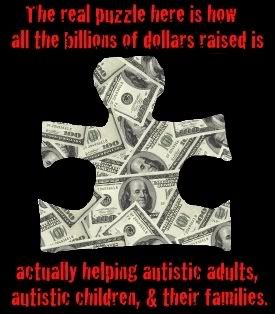





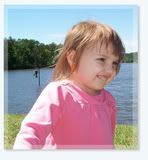

 This Way of Life
This Way of Life

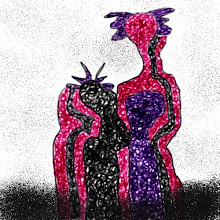

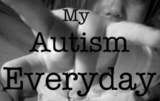





 "Autism is a way of being. It is pervasive; it colors every experience, every sensation, perception, thought, emotion, and encounter, every aspect of existence. It is not possible to separate the autism from the person."
- Jim Sinclair
"Autism is a way of being. It is pervasive; it colors every experience, every sensation, perception, thought, emotion, and encounter, every aspect of existence. It is not possible to separate the autism from the person."
- Jim Sinclair


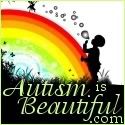






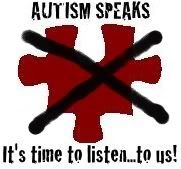




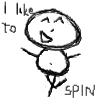







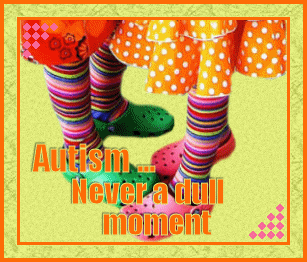

2 comments:
Hmmn. I have three neurotypical kids, all of whom are now 19 or older.
PT score: 2 for three: one of whom has had physical therapy (for painfully flat feet). The other PT for a gait abnormality.
Speech & Language: should have had the middle one in speech as he had a heavy baby accent (we're Californians, he sounded like he was from Detroit in the 30s until 3rd grade--but it didn't affect reading acquisition, so why bother?) Youngest had a short foray into speech as part of dyslexia until we decided it wasn't of much utility.
All liked weighted blankets. I had a few around from a previous snow-sports enterprise -- big hit in the playroom in winter.
Visual Schedules -- instituted these when I became a stepmother as the middle child wasn't reading yet & found the morning and evening routine daunting. It just became a habit--more effective for getting things done than a star chart or anything like that.
Dietary restrictions -- well, not the GFCF, but definitely the cruciferous-vegetables-free diet -- none seem to agree with the menfolk in my family. Also the menfolk had a strong preference for a really predictable menu. Not as rigid as the family I grew up in (meatloaf on Thursdays or the sky would fall...) but pretty danged predictable.
Probiotics--not all the time, but always after antibiotic treatments.
And the youngest NT kiddo? But dyslexic: Slingerland + Lindamood Bell.
My final comment: equating:
intense approaches such as ABA more child-centered/lead therapies such as the weighted vests
parent-controlled approaches (GFCF, melatonin)*
controlled-substance drug therapies (risperdal)**
It isn't even apples and oranges, it is apples and jet fuel.
To be more clear: nothing much happens to the child in the short term if you (the parent) decides to discontinue OT. On the other hand, if you abruptly discontinue risperdal, the effect on your child may be serious.
-------
*to the best of my knowledge, melatonin is a mostly benign substance, although evidently overdose is possible--meaning one will sleep more, but that it is difficult to ingest enough to "overdose" in the sense of risking death or disability.
**The decision to administer psychoactive drugs to a minor or an incapacitated adult should not be taken lightly and should be discussed not only with the prescribing physician, but others on the team involved with the child's care.
That said, many children with autism and other neurological conditions fare better on psychoactive medication than without it.
Great points. I should have included all the "NT" children who receive all of those services as well. Heck, I had PT A LOT in my childhood, my husband had ST, my sister had ST... My older child has found great help with visual schedules too. She is begging me for a weighted blanket now as well!
They take a study like this, and turn it into "pity me, autism is the worst, look at all I have to deal with." Ultimately, it offers us little to nothing, with regard to autism-specific information. As you have pointed out, so many children at some point will have therapy or make use of such tools.
Important distinctions you make regarding the medication. Thank you for your comment! Take care.
Post a Comment